| |||||
| Decades: | |||||
|---|---|---|---|---|---|
| See also: | |||||
Events from the year 1860 in the United States.
| |||||
| Decades: | |||||
|---|---|---|---|---|---|
| See also: | |||||
Events from the year 1860 in the United States.


The 1860 United States presidential election was the 19th quadrennial presidential election, held on Tuesday, November 6, 1860. In a four-way contest, the Republican Party ticket of Abraham Lincoln and Hannibal Hamlin, absent from the ballot in ten slave states, won a national popular plurality, a popular majority in the North where states already had abolished slavery, and a national electoral majority comprising only Northern electoral votes. Lincoln's election thus served as the main catalyst of the states that would become the Confederacy seceding from the Union. This marked the first time that a Republican was elected president. It was also the first presidential election in which both major party candidates were registered in the same home state; the others have been in 1904, 1920, 1940, 1944, and 2016.
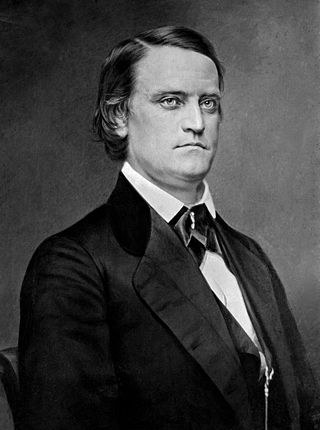
John Cabell Breckinridge was an American lawyer, politician, and soldier. He represented Kentucky in both houses of Congress and became the 14th and youngest-ever Vice President of the United States. Serving from 1857 to 1861, he took office at the age of 36. He was a member of the Democratic Party, and ran for president in 1860 as a Southern Democrat. He served in the U.S. Senate during the outbreak of the American Civil War, but was expelled after joining the Confederate Army. He was appointed Confederate Secretary of War in 1865.

John Jordan Crittenden was an American statesman and politician from the U.S. state of Kentucky. He represented the state in the U.S. House of Representatives and the U.S. Senate and twice served as United States Attorney General in the administrations of William Henry Harrison, John Tyler, and Millard Fillmore. He was also the 17th governor of Kentucky and served in the state legislature. Although frequently mentioned as a potential candidate for the U.S. presidency, he never consented to run for the office.

The Corwin Amendment is a proposed amendment to the United States Constitution that has never been adopted, but owing to the absence of a ratification deadline, could still be adopted by the state legislatures. It would shield slavery within the states from the federal constitutional amendment process and from abolition or interference by Congress. Although the Corwin Amendment does not explicitly use the word slavery, it was designed specifically to protect slavery from federal power. The outgoing 36th United States Congress proposed the Corwin Amendment on March 2, 1861, shortly before the outbreak of the American Civil War, with the intent of preventing that war and preserving the Union. It passed Congress but was not ratified by the requisite number of state legislatures.

The Constitutional Union Party was a United States third party active during the 1860 elections. It consisted of conservative former Whigs, largely from the Southern United States, who wanted to avoid secession over the slavery issue and refused to join either the Republican Party or the Democratic Party. The Constitutional Union Party campaigned on a simple platform "to recognize no political principle other than the Constitution of the country, the Union of the states, and the Enforcement of the Laws".

The 1860 Democratic National Conventions were a series of presidential nominating conventions held to nominate the Democratic Party's candidates for president and vice president in the 1860 election. The first convention, held from April 23 to May 3 in Charleston, South Carolina, failed to nominate a ticket, while two subsequent conventions, both held in Baltimore, Maryland in June, nominated two separate presidential tickets.
The Crittenden Compromise was an unsuccessful proposal to permanently enshrine slavery in the United States Constitution, and thereby make it unconstitutional for future congresses to end slavery. It was introduced by United States Senator John J. Crittenden on December 18, 1860. It aimed to resolve the secession crisis of 1860–1861 that eventually led to the American Civil War by addressing the fears and grievances of Southern pro-slavery factions, and by quashing anti-slavery activities. The Crittenden Compromise is not to be confused with the Crittenden Resolution, which provided that the Union would take no actions against slavery.

The 36th United States Congress was a meeting of the legislative branch of the United States federal government, consisting of the United States Senate and the United States House of Representatives. It met in Washington, D.C. from March 4, 1859, to March 4, 1861, during the third and fourth years of James Buchanan's presidency. The apportionment of seats in the House of Representatives was based on the 1850 United States census. The Senate had a Democratic majority, and the House had a Republican plurality.

The Peace Conference of 1861 was a meeting of 131 leading American politicians in February 1861, at the Willard Hotel in Washington, D.C., on the eve of the American Civil War. The conference's purpose was to avoid, if possible, the secession of the eight slave states from the upper and border South that had not done so as of that date. The seven states that had already seceded did not attend.

Henry Cornelius Burnett was an American politician who served as a Confederate States senator from Kentucky from 1862 to 1865. From 1855 to 1861, Burnett served four terms in the United States House of Representatives. A lawyer by profession, Burnett had held only one public office—circuit court clerk—before being elected to Congress. He represented Kentucky's 1st congressional district immediately prior to the Civil War. This district contained the entire Jackson Purchase region of the state, which was more sympathetic to the Confederate cause than any other area of Kentucky. Burnett promised the voters of his district that he would have President Abraham Lincoln arraigned for treason. Unionist newspaper editor George D. Prentice described Burnett as "a big, burly, loud-mouthed fellow who is forever raising points of order and objections, to embarrass the Republicans in the House".

The presidency of James Buchanan began on March 4, 1857, when James Buchanan was inaugurated as 15th president of the United States, and ended on March 4, 1861. Buchanan, a Democrat from Pennsylvania, took office as the 15th United States president after defeating former President Millard Fillmore of the American Party, and John C. Frémont of the Republican Party in the 1856 presidential election.
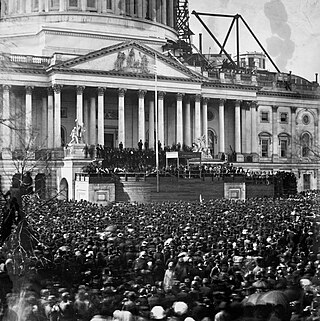
The first inauguration of Abraham Lincoln as the 16th president of the United States was held on Monday, March 4, 1861, at the East Portico of the United States Capitol in Washington, D.C. This was the 19th inauguration and marked the commencement of the first, and eventually only full term of Abraham Lincoln as president and the only term of Hannibal Hamlin as vice president. The presidential oath of office was administered to Lincoln by Roger B. Taney, the Chief Justice of the United States. John C. Breckinridge became the first outgoing vice president to administer the vice-presidential oath of office to his successor.
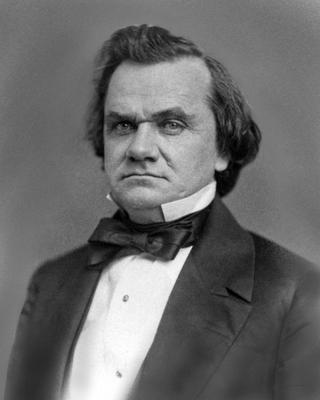
Stephen Arnold Douglas was an American politician and lawyer from Illinois. A senator, he was one of two nominees of the badly split Democratic Party for president in the 1860 presidential election, which was won by Republican candidate Abraham Lincoln. Douglas had previously defeated Lincoln in the 1858 United States Senate election in Illinois, known for the pivotal Lincoln–Douglas debates. He was one of the brokers of the Compromise of 1850 which sought to avert a sectional crisis; to further deal with the volatile issue of extending slavery into the territories, Douglas became the foremost advocate of popular sovereignty, which held that each territory should be allowed to determine whether to permit slavery within its borders. This attempt to address the issue was rejected by both pro-slavery and anti-slavery advocates. Douglas was nicknamed the "Little Giant" because he was short in physical stature but a forceful and dominant figure in politics.
Events from the year 1861 in the United States. This year marked the beginning of the American Civil War.
Events from the year 1858 in the United States.

The 1858–59 United States Senate elections were held on various dates in various states. As these U.S. Senate elections were prior to the ratification of the Seventeenth Amendment in 1913, senators were chosen by state legislatures. Senators were elected over a wide range of time throughout 1858 and 1859, and a seat may have been filled months late or remained vacant due to legislative deadlock. In these elections, terms were up for the senators in Class 2.
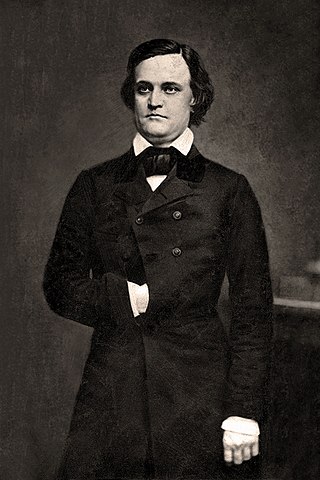
The political career of John C. Breckinridge included service in the state government of Kentucky, the Federal government of the United States, as well as the government of the Confederate States of America. In 1857, 36 years old, he was inaugurated as Vice President of the United States under James Buchanan. He remains the youngest person to ever hold the office. Four years later, he ran as the presidential candidate of a dissident group of Southern Democrats, but lost the election to the Republican candidate Abraham Lincoln.

The 1860 United States elections elected the members of the 37th United States Congress. The election marked the start of the Third Party System and precipitated the Civil War. The Republican Party won control of the presidency and both houses of Congress, making it the fifth party to accomplish such a feat. The election is widely considered to be a realigning election.
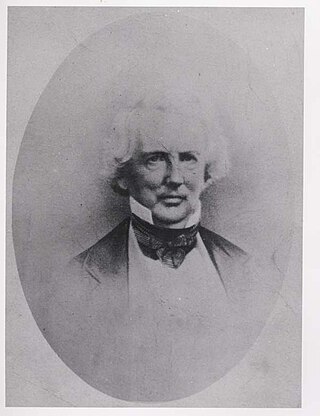
The Virginia Secession Convention of 1861 was called in the state capital of Richmond to determine whether Virginia would secede from the United States, govern the state during a state of emergency, and write a new Constitution for Virginia, which was subsequently voted down in a referendum under the Confederate Government.
The presidential transition of Abraham Lincoln began when he won the United States 1860 United States presidential election, becoming the president-elect of the United States, and ended when Lincoln was inaugurated at noon on March 4, 1861.